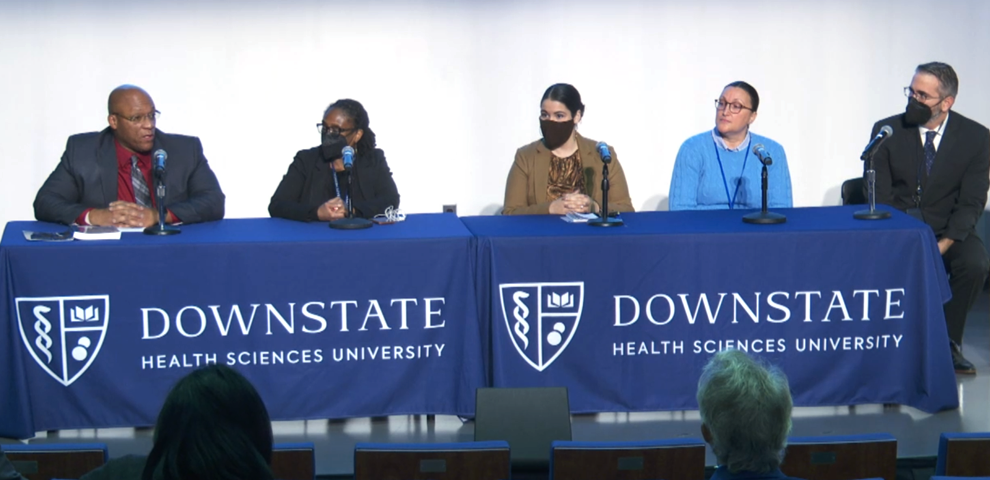Research Ethics to Advance Health Equity Symposium Addresses Difficult Topic
By Office of The President | Nov 29, 2022

As part of Downstate’s commitment to advancing health equity, The John Conley Division of Medical Ethics & Humanities presented its Research Ethics to Advance Health Equity Symposium focused on critical facets of ethical behavior in community-facing research. Speakers addressed why ethical behavior is foundational to Downstate’s research mission and how it informs and shapes our work.
Thank you to the conference’s key organizers, Jason Lazar, M.D., COM Education vice dean and Medical Education Department chair; F. Charles Brunicardi, M.D., COM dean and senior vice president; David Christini, Ph.D., Research senior vice president, and Graduate Studies School interim dean; and Christopher Roman, Ph.D., COM assistant dean and Cell Biology vice chair, and Thomas Mackie, Ph.D., MPH, SPH chair and Health Policy and Management associate professor.
W. Marcus Lambert, Ph.D., Research Strategy and Operations associate vice president, recounted the Henrietta Lacks story in detail. Lacks, a young Black cancer patient, was treated at Johns Hopkins in the 1950s for cervical cancer. Without her knowledge and consent, her cells were harvested for the first successful attempt to culture and grow cancer cell lines. These cells were then mass-produced and used widely in testing and developing cancer treatments. Pharmaceutical companies and Johns Hopkins reaped huge profits without compensation to the Lacks family or even an acknowledgment of her contribution—an extreme example of a major ethical failure. Mrs. Lacks’ unwitting legacy has saved countless lives; however, this was at a high cost: yet another historical reason for communities of color to distrust the research community.
A panel discussion followed with Dr. Thomas Mackie; Allen Lewis, Ph.D., CRC, SOHP dean, and professor; Carla Boutin-Foster, M.D., MSc., COM Diversity Education and Research associate dean and Institutional Equity Office associate vice president; Marlene Camacho-Rivera, SC.D., MS, MPH, SPH Student Affairs assistant dean; and Marie-Claire Roberts, Ph.D., M.S., MPA, RN, CON Scholarship associate dean and associate professor. Panelists each described the ethical underpinnings and frameworks used by their respective colleges or schools to ensure that researchers actively build community trust, include diverse participants, and ensure further traumatized or exploitation in these communities would not occur.
This interprofessional collaboration among the schools is a stellar example of why Downstate is such a unique place; it is a practice I strongly endorse and encourage.
The keynote speech, “Missing Diversity in Human Genetic Studies Limits Precision Medicine,” was delivered by Roseann E. Peterson, Ph.D., Director of Training in Research Ethics and Scientific Integrity, a recent recruit from Virginia Commonwealth University. Dr. Peterson discussed how national genetic data sets are not representative and largely reflect participants of European heritage. Because of this, genetic risk predictions can be significantly skewed—yet they continue to be the basis of general assumptions on which drug research and treatment are based.
The conference began and ended with moving tributes and remembrances by Dr. Lazar and Dr. Roman honoring Kathleen Powderly, Ph.D., CNM, former Director of the John Conley Division of Medical Ethics and Humanities. They recalled her passion for the faculty, the Conley students, and her work. Dr. Powderly, who passed away a year ago, was renowned as a medical educator, historian, clinical ethicist, and nurse midwife who held cross-appointments in Medicine and Nursing.
Dr. Roman also recognized the Conley Scholars, many of whom are now graduates. They continue to advocate nationwide for ethical principles in research and clinical care.
Tags: Research, Events, Ethics, Rheumatology